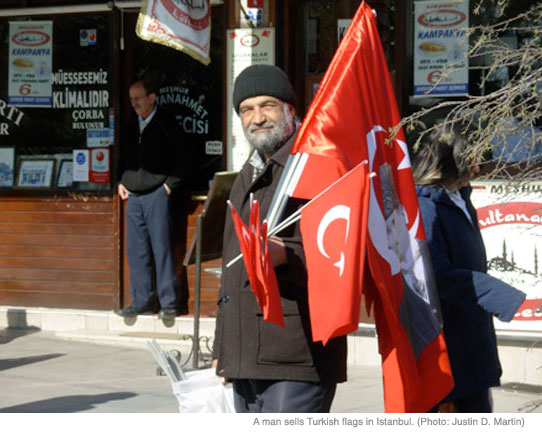ISTANBUL, TURKEY—I must agree with New York Times columnist Thomas Friedman that “Turkey is a country that had me at hello.” I’ve visited Turkey five times, and on each trip I want to stay longer. Think of the best meal you’ve ever eaten, the most staggering coastal views you’ve scanned, the warmest people ever to shake your hand, and one of the world’s most enchanting histories. Now fly to Turkey and savor all that in one place.
Because of all of Turkey’s riches, though, I’m puzzled by Article 301 of the country’s penal code, which promises imprisonment of six months to two years for “insulting the Turkish nation.” The article also criminalizes “denigration of the government of the Republic of Turkey,” as well as the judiciary and the military. Until 2008, the law prohibited insulting “Turkishness,” and while this wording was tweaked, the spirit of the law is unchanged.

I’m confused by these dictates not because they’re undemocratic, which they are. Or because they’re unwelcome in a modern community of nations. I’m mostly confused by Article 301 because it’s unnecessary. Turkish pride is not in short supply, for a number of good reasons. Turkey is one of world’s great economic success stories of the last 100 years. It’s a modern country knocking on the door of the European Union. It is a worldwide cultural leader. This country of around 78 million people hosts upwards of 30 million visitors a year.
Great nations are lifted by the pride of their people even when their flaws are known and openly communicated. The Fourth of July in the U.S. is a day of great pride, even among Americans who are aware of FDR’s decision to intern Japanese Americans during WWII and the order to invade Iraq in 2003 based on absurdly inadequate intelligence.
So, too, does affinity for one’s Turkishness not depend on ignoring Turkish massacring of Armenians in 1915, the severe alcoholism of modern founding hero Mustafa Kemal Ataturk, or the ongoing denial of various freedoms to Kurds concentrated in the southeastern reaches of the country. Plenty of Turks are aware of these blots, and yet Turkish nationalism is still a meaningful political and social force.
One of the most discouraging aspects of unassailable Turkishness is the vagueness of such a prohibition. Saudi Arabians who lampoon their king go to jail. Singaporeans who question the legitimacy of the Lee dictatorship are either imprisoned or punitively sued for “libel.” These are self-anointed political figures that are above speculation, but they are people. The “Turkish Nation,” which Article 301 specifically prohibits citizens from denigrating, is amorphous, the boundaries of which are unknown to writers and artists. It is an abstraction that has no place in the rule of law.
Don’t necessarily expect that the European Union will make abolishing Article 301 a firm condition of Turkey’s EU admission. While this may be possible, a number of EU members have laws limiting speech that would be unconstitutional in the U.S., such as laws criminalizing the denial of the Holocaust. “Other countries that [Americans] think of as like our own—Britain, for example—have many more restrictions on what can be said,” Anthony Lewis wrote in Freedom for the Thought That We Hate. If the EU were to demand that Turkey rescind Article 301, for example, the government in Ankara could rightly point out the harshness of British libel laws that frequently put U.K. reporters in undue danger.
To repeal the muzzle of Article 301, the Turkish government must recognize that the measure is ineffective and unnecessary. Turkish pride exists for legitimate reasons that have nothing to do with the Turkish government’s taste for controlling speech, and harboring laws protecting Turkishness won’t sustain or increase nationalistic feelings. Citizens are willing to stick up for countries that provide them with decent services and security, and that give them freedom to speak, move and produce. Turkey has done most of these things. Tolerance of seditious libel in Turkey will bolster, not weaken, the government’s legitimacy. Laws banning criticism of government are vile in any case, of course, but they’re particularly puzzling in a country that gets things done. Turkey doesn’t malfunction like Zimbabwe or North Korea, and it doesn’t need protectionist codes stacking opaque concepts like government and national identity out of critical reach.
Justin D. Martin is a journalism professor at Northwestern University in Qatar. Follow him on Twitter: @Justin_D_Martin
